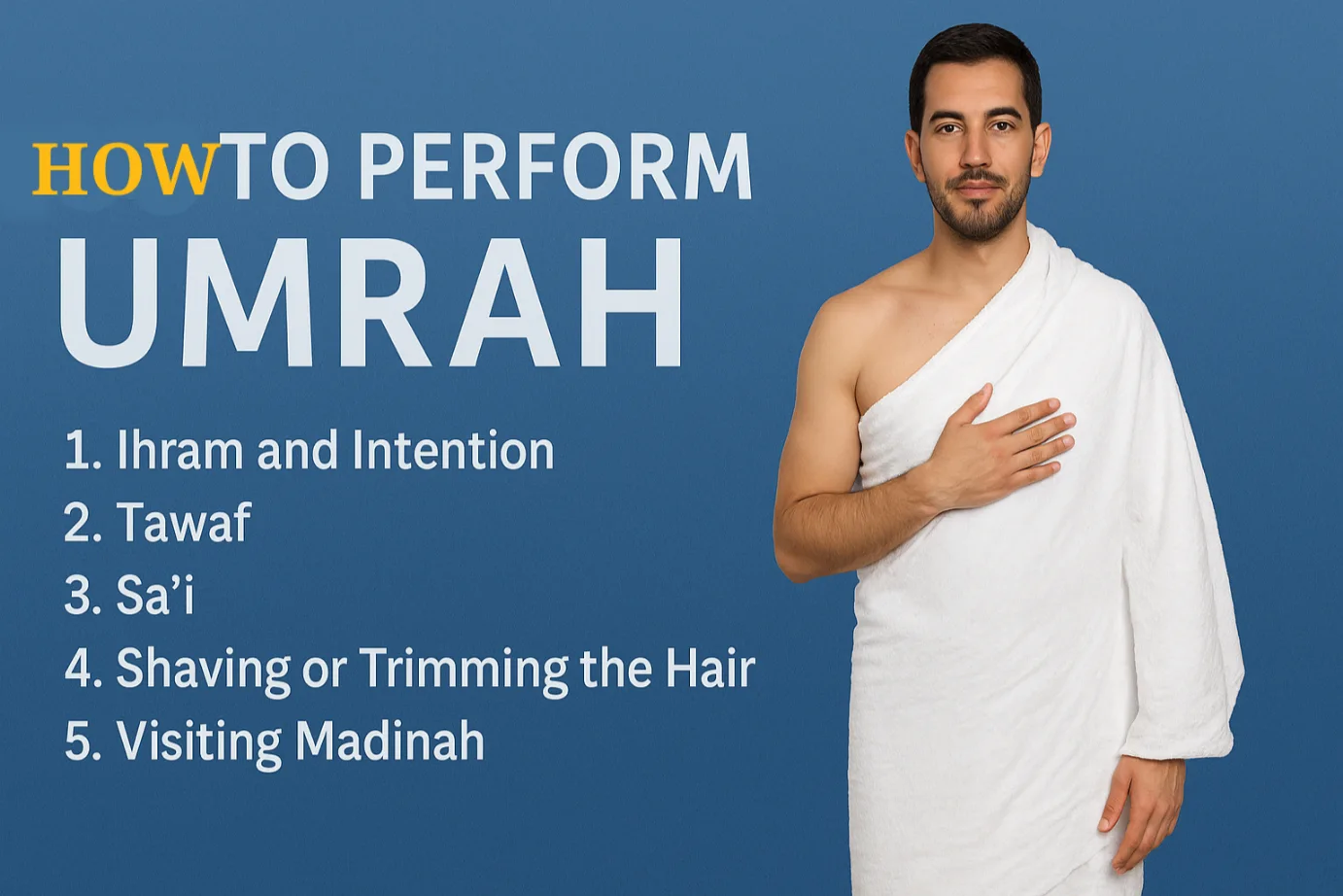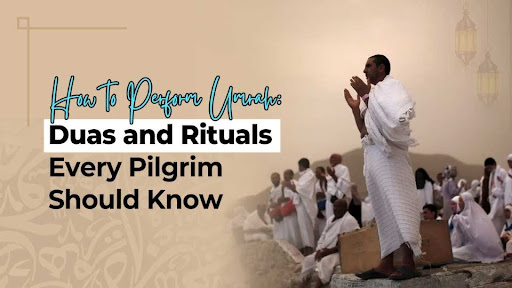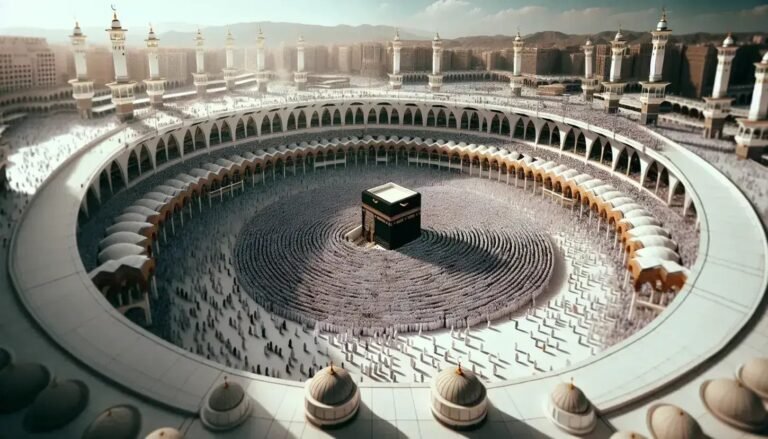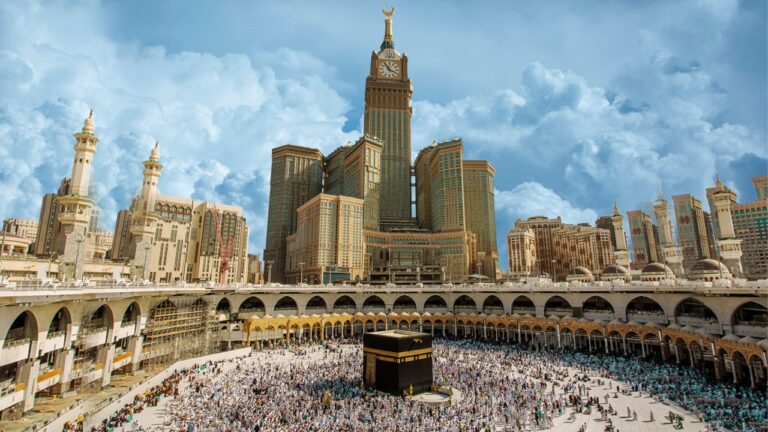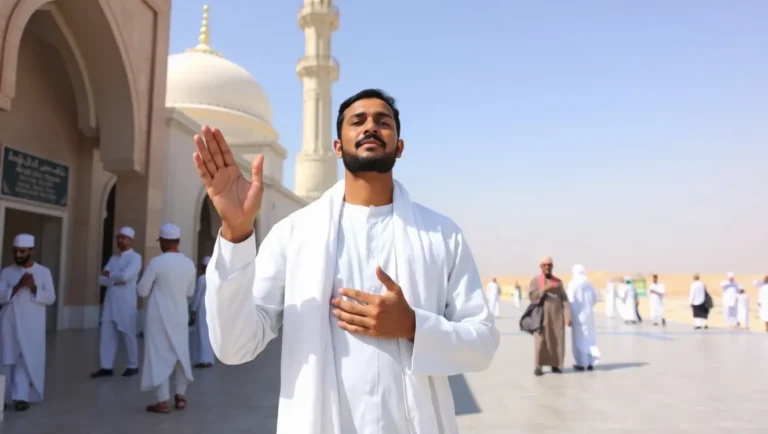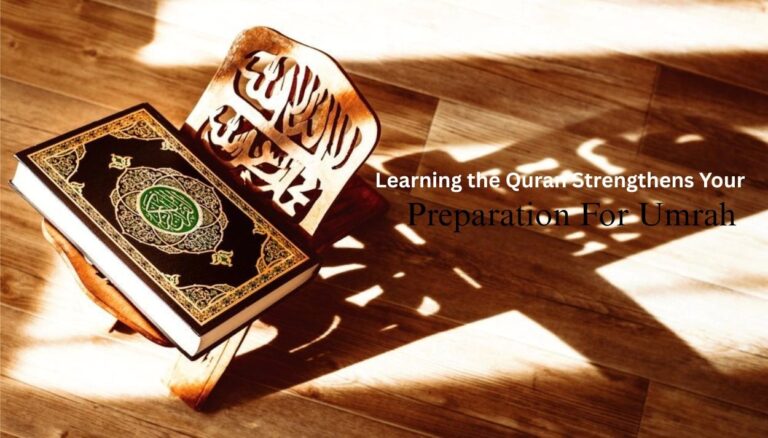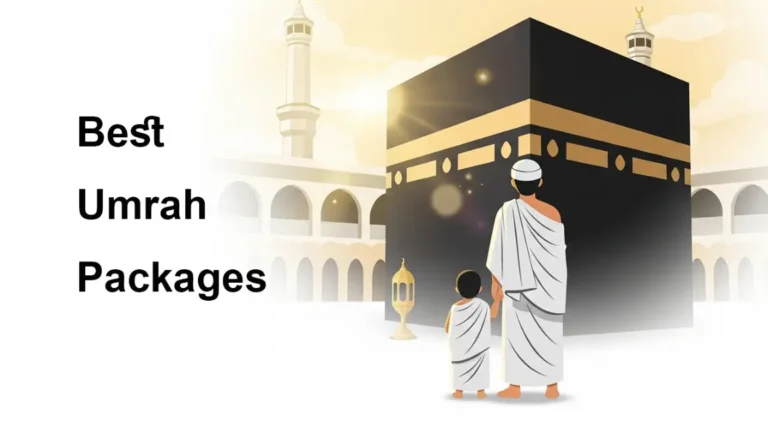How to perform Umrah is a question that touches the heart of every sincere Muslim. For many, the goal is not only to go to Makkah; it’s to stand before the Kaaba, crying and praying to Allah. Umrah is a special act of worship. Though Hajj is required, Umrah is not and still offers great spiritual benefits which can be done at any time.
Millions of Muslims every year give up their usual activities and worldly concerns. They begin a process of giving up, being humble and changing. Umrah is not only about performing a certain ritual. Allah is calling us to purify our souls, renew our hearts and become better Muslims.
How do you make sure you do Umrah in the proper way? What do you need to do? Which duas are you supposed to say when you reach each sacred point?
This guide will walk you through every stage of the Umrah experience—from the moment you make your niyyah (intention) to the final act of halq (shaving) or taqsir (trimming the hair). All the parts have important Arabic duas, along with transliteration and translation, to help you feel close to God and sure of yourself during your trip.
We begin this holy journey by saying the name of Allah, step by step.
Step 1 – Make Intention and Prepare for Umrah
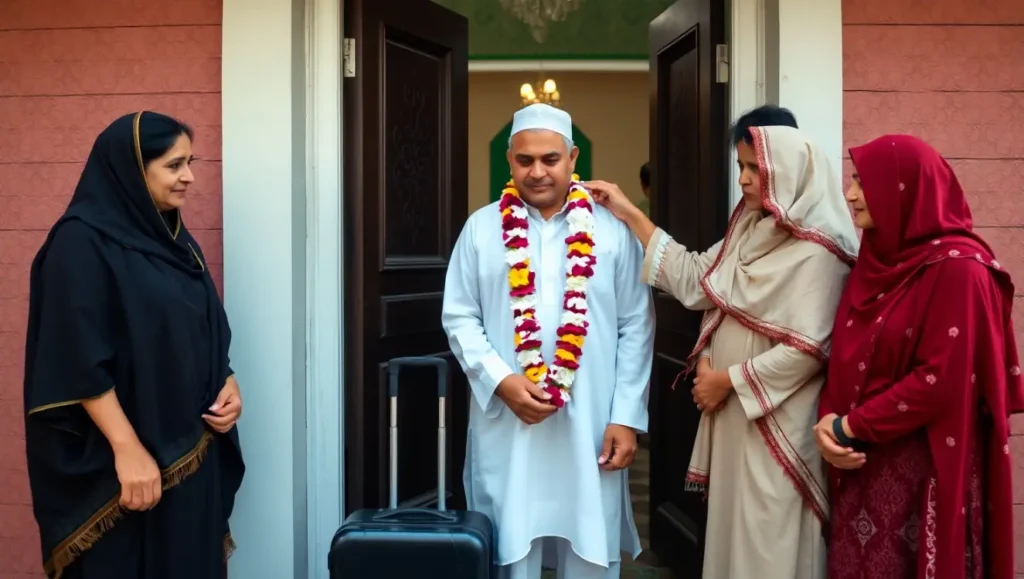
Why Intention Matters
Every act of worship in Islam begins with niyyah (intention). It is the basis for your Umrah. The Prophet Muhammad ﷺ stated:
“Verily, deeds are judged by intentions.” (Sahih al-Bukhari)
You should make sure your heart is ready before you pack your bags or put on Ihram. You are not only traveling—you are responding to Allah’s request.
Furthermore you should always remember that your intention is to please Allah alone.
Repent and Cleanse the Heart
Before you set out, take time for tawbah (repentance). Ask Allah to forgive all the wrong things you have done. If you have hurt someone, ask them for forgiveness. Walk into Makkah with a light heart.
You should also pray two rak’ahs of Salat al-Tawbah. In your sujood, make a request to Allah for a safe journey, an accepted Umrah and a spiritual change.
Du’a Before Leaving for Umrah
When you set out from your home or hotel for the umrah journey, say the du’a for travel.
اللّٰهُمَّ إِنَّا نَسْأَلُكَ فِي سَفَرِنَا هَذَا البِرَّ وَالتَّقْوَى، وَمِنَ العَمَلِ مَا تَرْضَىاللّٰهُمَّ هَوِّنْ عَلَيْنَا سَفَرَنَا هَذَا وَاطْوِ عَنَّا بُعْدَهُاللّٰهُمَّ أَنْتَ الصَّاحِبُ فِي السَّفَرِ وَالخَلِيفَةُ فِي الأَهْلِ
Urdu Translation:
اے اللہ! ہم آپ سے اپنے اس سفر میں نیکی، تقویٰ، اور ایسے اعمال کی توفیق مانگتے ہیں جن سے آپ راضی ہوں۔ اے اللہ! ہمارے لیے اس سفر کو آسان بنا دے اور اس کے فاصلے کو ہم پر مختصر فرما دے۔ اے اللہ! آپ ہی سفر میں ہمارے ساتھی ہیں اور گھر والوں میں ہمارے نگہبان ہیں۔
Transliteration: Allahumma inna nas’aluka fi safarina hadhal birra wat-taqwa, wa minal ‘amali ma tardha. Allahumma hawwin ‘alayna safarana hadha watwi ‘anna bu’dah. Allahumma Antas-sahibu fis-safar wal-khalifatu fil-ahl.
Translation: O Allah, we ask You in this journey for righteousness and piety, and deeds that please You. O Allah, make this journey easy for us and shorten its distance. O Allah, You are our Companion on the road and the Guardian over our families.
Checklist: Things to Prepare Before Leaving
Spiritual Readiness
- Learn the steps of Umrah in advance
- Memorize or print important duas
- Read about the virtues of Umrah
- Write down personal duas you wish to make at the Kaaba
Documents and Essentials
- Passport with Umrah visa
- Flight tickets and hotel booking
- Proof of vaccination (if required)
- Ihram (2 white unstitched pieces for men, loose and modest dress for women)
- Unscented soap, shampoo, and deodorant
- Prayer mat, tasbeeh, mini Qur’an
- Comfortable sandals/slippers
- Waist pouch or shoulder bag (for men)
Phone & Tech
- Install a Qiblah finder, du’a app, and offline Quran
- Keep your power bank and charging cables
Health
- Take any needed medications
- Stay hydrated during the trip
- Wear a mask if needed in crowded places
Mental and Emotional Preparation
Keep in mind: this could be the last chance you ever visit the Kaaba. Be humble, not proud. Be thankful, not demanding. Have hope, not pride.
Your Umrah starts well before you reach the Kaaba. It starts when you truly decide to obey Allah.
Step 2 – Entering the State of Ihram at Miqat

What is Ihram?
Every pilgrim must enter the state of Ihram before they can start the rites of Umrah. It separates your everyday life from the spiritual journey that is coming. As soon as you enter Ihram, you are directly following Allah’s commands.
Where to Enter Ihram (Miqat)
The Prophet Muhammad ﷺ chose the Miqat as the place where pilgrims should begin their state of Ihram. Every region has a specific Miqat point.
- Dhul Hulaifah (Abyar Ali) – for people coming from Madinah
- Yalamlam – for pilgrims from Yemen or the Indian subcontinent (air travelers often cross this)
- Qarn al-Manazil – for those from Najd
- Juhfah – for pilgrims from the West
- Dhat Irq – for people coming from Iraq
When you’re flying, the airline will usually tell you when you are near the Miqat. Get ready to enter Ihram before you cross the border.
Sunnah Actions Before Wearing Ihram
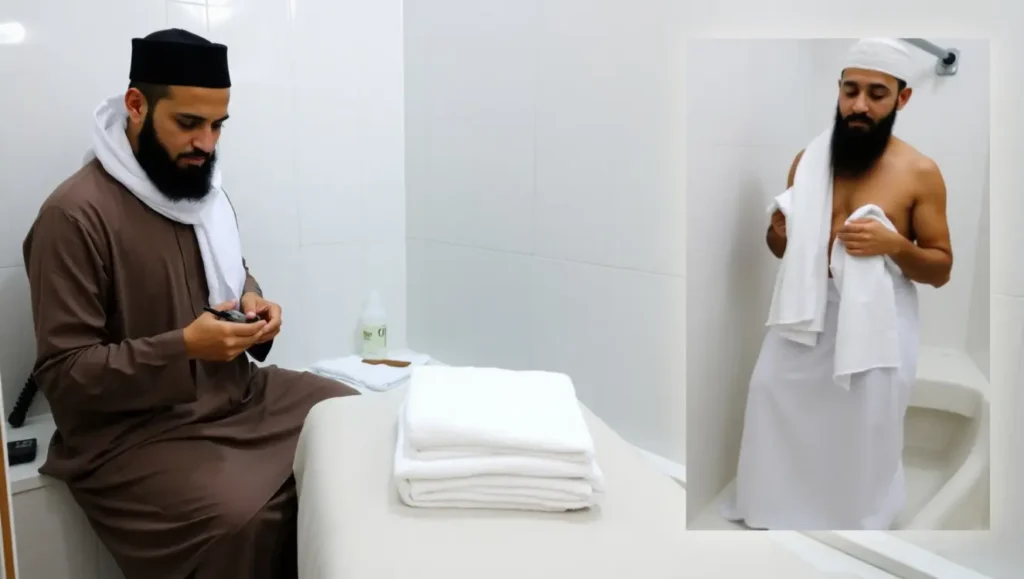
These acts are recommended before wearing Ihram (especially for men):
- Ghusl (ritual bath) – cleanse the body and soul
- Trim nails, remove armpit and pubic hair
- Apply fragrance (only before wearing Ihram)
- Wear Ihram garments:
- Men: 2 unstitched white cloths (top and bottom)
- Women: modest, loose-fitting dress (no specific color required)
Two Rak’ah Nafl (Optional but Recommended)
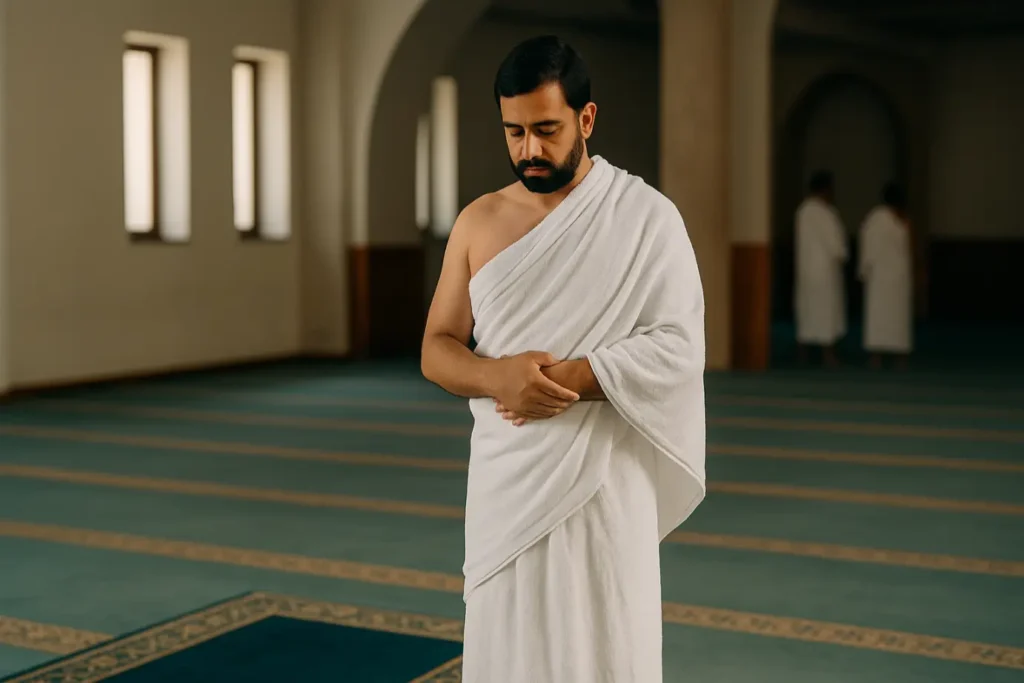
It is Sunnah to pray two nafl rak’ahs before you make the intention to enter Ihram. You might say:
- Surah Al-Kafirun in the first rak’ah
- Surah Al-Ikhlas in the second rak’ah
After you finish salah, ask Allah to make your Umrah easy and accepted.
Making Intention (Niyyah) for Umrah
Once dressed and ready, you declare your intention:
اللَّهُمَّ لَبَّيْكَ عُمْرَةً
Urdu translation:
اے اللہ! میں عمرہ کے لیے حاضر ہوں۔
Transliteration: Allahumma labbayka ‘Umrah
Translation: O Allah, I intend to perform Umrah in Your name and for Your sake.
This statement is the first step in your Umrah. You have entered the state of Ihram, so all its rules are in effect.
Start Reciting the Talbiyah
Immediately after making your intention, begin reciting the Talbiyah aloud (men) or softly (women):
لَبَّيْكَ اللَّهُمَّ لَبَّيْكَ، لَبَّيْكَ لَا شَرِيكَ لَكَ لَبَّيْكَ، إِنَّ الْحَمْدَ وَالنِّعْمَةَ لَكَ وَالْمُلْكَ، لَا شَرِيكَ لَكَ
Urdu Translation:
میں حاضر ہوں اے اللہ! میں حاضر ہوں، میں حاضر ہوں، تیرا کوئی شریک نہیں، میں حاضر ہوں، بے شک تمام تعریف اور نعمتیں تیرے ہی لیے ہیں، اور بادشاہی بھی، تیرا کوئی شریک نہیں۔
Transliteration: Labbayka Allahumma labbayk, labbayka laa shareeka laka labbayk, innal-hamda wan-ni’mata laka wal-mulk, laa shareeka lak
Translation: Here I am, O Allah, here I am. Here I am, You have no partner, here I am. Surely, all praise, grace, and kingdom belong to You. You have no partner.
Say the Talbiyah often as you make your way to Makkah. Say it after every prayer, after every important action and most of all when your heart is full.
Prohibited Acts in Ihram
Once in Ihram, you must avoid the following:
- Cutting hair or nails
- Using scented products (perfume, soaps, oils)
- Wearing stitched clothing (men only)
- Engaging in sexual intimacy or flirtation
- Hunting or killing animals
- Fighting, arguing, or using foul language
- Covering the head (men) or face (women, with niqab)
These prohibitions preserve the sanctity and humility of your journey.
Tip for Air Travelers
- Wear Ihram at home or in the airport lounge.
- Do not delay niyyah beyond Miqat. If in doubt, make the intention early.
Reminder
Every second you are in Ihram is considered holy. Guard your tongue, keep your eyes pure, and spend your time reciting Talbiyah, Dhikr and Du’a. Your heart has been invited to appear before Allah.
After that, we’ll reach Makkah and enter Masjid al-Haram, remembering to behave properly and say duas when you first see the Kaaba.
Step 3 – Entering Masjid al-Haram and the First Sight of the Kaaba
Arrival in Makkah: The Holiest City
When you see Makkah from your bus, taxi or plane, your heart will begin to beat faster. You’re not only coming to a city—you’re coming to the most holy place on the planet. You are filled with Talbiyah in your voice and awe in your heart.
Keep reciting: “Labbayka Allahumma Labbayk…”
This is a moment many people wait their whole lives for.
Reaching Masjid al-Haram
When you get there, keep your cool and be modest. Don’t rush. Keep in mind, you are entering the House of Allah.
- Ensure your Ihram is still intact.
- Keep your heart focused.
- Enter with your right foot first.
Dua When Entering Masjid al-Haram
As you enter through any gate (e.g., Bab al-Salam, King Fahd Gate), recite this powerful du’a:
اللَّهُمَّ افْتَحْ لِي أَبْوَابَ رَحْمَتِكَ
Urdu Translation:
اے اللہ! میرے لیے اپنی رحمت کے دروازے کھول دے۔
Transliteration: Allahumma iftah li abwaba rahmatik
Translation: O Allah, open for me the doors of Your mercy.
Remember to be sincere—you are not entering any ordinary building. You are entering the location where every prophet prayed.
The First Glance at the Kaaba
As soon as you see the Kaaba through the corridor, stop.
You should not be taking photos or letting your mind wander at this point. Look down for a short time. After that, raise your hands and pray to Allah. Many scholars say that your first sight of the Kaaba is a time when your prayers are answered.
Here’s what to do:
- Raise your hands in du’a.
- Let tears fall freely if they come.
- Praise Allah and send salawat on the Prophet Muhammad ﷺ.
- Ask Allah for the deepest desires of your heart.
Recommended Dua at First Sight of the Kaaba:
اللَّهُمَّ زِدْ هَذَا الْبَيْتَ تَشْرِيفًا وَتَعْظِيمًا وَتَكْرِيمًا وَمَهَابَةً، وَزِدْ مَن شَرَّفَهُ وَعَظَّمَهُ مِمَّن حَجَّهُ أَوِ اعْتَمَرَهُ تَشْرِيفًا وَتَكْرِيمًا وَتَعْظِيمًا وَبِرًّا
Urdu Translation:
اے اللہ! اس گھر (کعبہ) کو عزت، عظمت، تکریم اور ہیبت میں مزید اضافہ عطا فرما، اور جو شخص بھی اس کی تعظیم کرے، چاہے وہ حج کرے یا عمرہ، اسے بھی عزت، تکریم، عظمت اور نیکی میں اضافہ عطا فرما۔
Transliteration: Allahumma zid hadhal-bayta tashreefan wa ta’dheeman wa takreeman wa mahabatan, wazid man sharrafahu wa ‘azzamahu mimman hajjahu awi’tamarahu tashreefan wa takreeman wa ta’dheeman wa birra.
Translation: O Allah, increase this House in honor, nobility, reverence, and dignity. And increase the honor, nobility, reverence, and righteousness of those who visit it for Hajj or Umrah.
You can also make any personal du’a for your family, your sins, your future or your afterlife.
Emotional and Spiritual Reminder
This is not a place for tourists. This is the time when you meet Allah. All the movements in this mosque are significant. All of your looks, heartbeats and words will be captured.
Remember to make this moment special by keeping these things in mind:
- You are being welcomed by Ar-Rahman.
- You are following in the footsteps of Ibrahim عليه السلام and Muhammad ﷺ.
- You are not just a person living in the world anymore. You have become a pilgrim.
Next Step: Begin Your Tawaf
After seeing the Kaaba, your next important action is to perform Tawaf which is the main part of your Umrah. In the next section, we will guide you through 7 full circuits of the Kaaba, showing you the exact places, prayers and spiritual advice.
Step 4 – Performing Tawaf Around the Kaaba
What is Tawaf?
Tawaf is the act of walking around the Kaaba seven times in a counter-clockwise way. It represents the way believers come together to worship the One God. It also demonstrates how the angels walk around the throne of God.
There is a lot of light, presence and spiritual meaning in this act. While you walk, remember that your life is centered on Allah, just as your body is now turning toward His House.
Where and How to Begin
After you see the Kaaba, proceed to the Black Stone (Ḥajr al-Aswad) which is in the southeastern corner of the Kaaba. You should start your journey in line with it.
Before starting, uncover your right shoulder (for men only) — this is called Idtiba. Wrap the upper sheet of Ihram under your right arm and over your left shoulder.
❗ You must have wudu (ablution) before starting Tawaf.
Niyyah for Tawaf
Make a silent intention in your heart:
“O Allah, I intend to perform Tawaf of the Kaaba for Umrah, seeking Your pleasure alone.”
Step 1: Facing the Black Stone (Ḥajr al-Aswad)
When you are directly in line with the Black Stone:
- Raise your hands to your ears.
- Say:
بِسْمِ اللَّهِ، اللَّهُ أَكْبَرُ
Urdu Translation:
اللہ کے نام سے، اللہ سب سے بڑا ہے۔
Transliteration: Bismillahi Allahu Akbar
Translation: In the name of Allah, Allah is the Greatest.
- If you are able to, kiss the Black Stone or touch it with your hand. If you can’t do it, use both hands to point and continue.
This is called Istilam.
Step 2: Walk in a Counter-Clockwise Direction
You will now walk seven times completely around the Kaaba.
You must keep the Kaaba on your left side during Tawaf.
The area between the Black Stone and the Yemeni Corner (Rukn al-Yamani) is a special place for du’a.
Duas During Tawaf
There is no fixed du’a that you must say in each round, but these are some authentic and helpful supplications you can say:
Between Rukn al-Yamani and the Black Stone (every round):
رَبَّنَا آتِنَا فِي الدُّنْيَا حَسَنَةً، وَفِي الآخِرَةِ حَسَنَةً، وَقِنَا عَذَابَ النَّارِ
Urdu translation:
اے ہمارے رب! ہمیں دنیا میں بھلائی عطا فرما، اور آخرت میں بھی بھلائی عطا فرما، اور ہمیں آگ کے عذاب سے بچا۔ یہ دعا طواف کے دوران خاص طور پر رکنِ یمانی اور حجرِ اسود کے درمیان پڑھی جاتی ہے۔
Transliteration: Rabbana atina fid-dunya hasanah, wa fil-akhirati hasanah, wa qina ‘adhaban-naar
Translation: Our Lord, give us good in this world, and good in the Hereafter, and save us from the punishment of the Fire.
General Duas During Tawaf:
You may also recite:
- SubhanAllah (Glory be to Allah)
- Alhamdulillah (All praise is for Allah)
- La ilaha illallah (There is no god but Allah)
- Allahumma ghfir li, warhamni (O Allah, forgive me, have mercy on me)
- Your own personal duas in your language
Keep your attention on the road, walk slowly and make sure not to bump into anyone. Tawaf is meant for worship, not for competing.
Step 3: Raml (For Men Only – First 3 Circuits)
In the first three rounds, men are advised to walk faster and lift their shoulders slightly. This is known as Raml and is a good practice to demonstrate strength and energy.
The last four rounds should be completed at a normal pace.
Step 4: Completing 7 Circuits
Once you finish the seventh round, pause at a suitable spot and cover your right shoulder again. You have finished your Tawaf.
Say:
اللَّهُ أَكْبَرُ، اللَّهُمَّ تَقَبَّلْ مِنِّي
Urdu Translation:
اللہ سب سے بڑا ہے، اے اللہ! میری عبادت قبول فرما۔
Allahu Akbar, Allahumma taqabbal minni
Allah is the Greatest, O Allah, accept it from me.
Step 5: Pray 2 Rak’ah Behind Maqam Ibrahim
Go to the station of Prophet Ibrahim عليه السلام which is called Maqam Ibrahim. If the mosque is very busy, you can pray anywhere inside.
In these two rak’ahs:
- Recite Surah Al-Kafirun in the first rak’ah
- Recite Surah Al-Ikhlas in the second
Remember to make du’a after you have finished. Ask Allah to forgive you, show you mercy and accept you.
Step 6: Drink Zamzam Water
After that, visit the Zamzam water stations and drink, hoping for healing, guidance and barakah.
Dua before drinking Zamzam:
اللَّهُمَّ اجْعَلْهُ عِلْمًا نَافِعًا، وَرِزْقًا وَاسِعًا، وَشِفَاءً مِّن كُلِّ دَاءٍ
Urdu Translation:
اے اللہ! اسے میرے لیے نفع بخش علم، کشادہ رزق، اور ہر بیماری سے شفا بنا دے۔
Transliteration: Allahumma aj‘alhu ‘ilman naafi‘an, wa rizqan waasi‘an, wa shifaa’an min kulli daa’
Translation: O Allah, make it beneficial knowledge, abundant provision, and a cure from every illness.
While drinking, face the Kaaba and pour some water over your head and body as a recommended practice and it is Sunnah.
Spiritual Reflection
Tawaf is not only about walking in a circle. It revolves around your main goal in life — Allah. It means ignoring everything else and concentrating solely on His love, His mercy and His greatness. You are not only moving; your soul is also moving in a circle.
In the following step, we will do Sa’i between Safa and Marwah, just as Hajrah did and explain every dua and action in detail.
Step 5 – Performing Sa’i Between Safa and Marwah
What is Sa’i?
Sa’i is the act of walking seven times back and forth between Safa and Marwah which are two small hills inside Masjid al-Haram. It remembers Hajrah (علیہا السلام), the wife of Prophet Ibrahim (علیہ السلام), who ran back and forth between these hills to find water for her son, Isma’il (علیہ السلام).
Now, every pilgrim experiences Hajar’s struggle, as it shows that Allah rewards those who are sincere.
Before Starting Sa’i
After completing Tawaf and drinking Zamzam, go to the hill of Safa. You can use wudu from before, but it is better to have fresh wudu.
Men: repeat the right shoulder covering (Idtiba ends at this point).
If you can see the Kaaba, stand facing it and start Sa’i.
Du’a at the Start (At Safa Hill)
Before starting your first lap, recite:
إِنَّ الصَّفَا وَالْمَرْوَةَ مِن شَعَائِرِ اللَّهِ، أَبْدَأُ بِمَا بَدَأَ اللَّهُ بِهِ
Urdu Translation:
بیشک صفا اور مروہ اللہ کی نشانیوں میں سے ہیں، میں اس (عمل) کی ابتداء کرتا ہوں جس سے اللہ نے ابتداء فرمائی۔
Transliteration: Inna as-Safa wal-Marwah min sha’a’irillah. Abda’u bima bada’Allahu bihi
Translation: Indeed, Safa and Marwah are among the symbols of Allah. I begin with what Allah began with.
Then raise your hands in du’a, face the Kaaba, and recite:
اللَّهُ أَكْبَرُ، اللَّهُ أَكْبَرُ، اللَّهُ أَكْبَرُ، وَلِلَّهِ الْحَمْدُ
Urdu Translation:
اللہ سب سے بڑا ہے، اللہ سب سے بڑا ہے، اللہ سب سے بڑا ہے، اور تمام تعریفیں اللہ ہی کے لیے ہیں۔
Transliteration: Allahu Akbar, Allahu Akbar, Allahu Akbar, wa lillahil hamd
Then say any du’as you wish. You can recite Quran, praise Allah, ask for forgiveness, and make personal supplications.
Make the du’a three times, pausing and praying in between each time.
Begin Walking Toward Marwah
Walk toward Marwah at a regular speed. This is the first time you are going around the track.
Men should walk quickly or jog lightly between the two green markers on the walls. Hajrah ran to this place because she was desperate and loved her son.
Women should walk normally throughout.
At Marwah Hill
When you arrive at Marwah, stop and act the same way you did at Safa.
- Face the Kaaba (if possible)
- Raise your hands
- Say “Allahu Akbar” three times
- Make personal du’a
This completes 1 lap.
Complete 7 Laps (Safa → Marwah = 1)
You should now keep walking between Safa and Marwah until you complete seven laps. Every time you go from Safa to Marwah and back, it is counted as one lap. Safa to Marwah is the first lap, Marwah to Safa is the second lap and so on.
The seventh and final lap ends at Marwah. At both ends of the journey, you can stop, face the Qiblah, raise your hands and repeat the same du’a, praying with the same devotion as Hajrah (علیہا السلام) did.
What to Read During Sa’i
There is no fixed dua, so you can:
- Praise Allah: SubhanAllah, Alhamdulillah, La ilaha illallah
- Ask for Jannah, protection from Hell
- Pray for your parents, children, family
- Make du’a for your goals, fears, and needs
- Recite Quran verses or make du’a in your own language
Suggested short du’a:
اللَّهُمَّ اغْفِرْ لِي وَارْحَمْنِي، وَاهْدِنِي، وَعَافِنِي، وَارْزُقْنِي
Urdu translation:
اے اللہ! مجھے بخش دے، مجھ پر رحم فرما، مجھے ہدایت دے، مجھے عافیت عطا فرما، اور مجھے رزق عطا فرما۔
Allahumma ighfir li, warhamni, wahdini, wa ‘afini, warzuqni
O Allah, forgive me, have mercy on me, guide me, grant me health, and provide for me.
After Completing the 7th Lap
After you have completed seven trips to Marwah, your Sa’i is finished.
Take a moment to pause, sit and think about what you have learned. You have just walked in the footsteps of a woman who had strong faith and unwavering trust. Allow that strength to become a part of your life.
After that, you will perform the final step of Umrah by cutting or shaving your hair.
Step 6 – Shaving or Trimming the Hair (Halq or Taqsir)
Why This Step Matters
The final act is not only a symbol; it is also a direct order from the Prophet Muhammad ﷺ. It indicates that Umrah is finished and it demonstrates your complete submission to Allah. You have completed the journey, made your prayers and now you show your humility by removing your hair for Him.
The Prophet Muhammad ﷺ said:
“O Allah, have mercy on those who shave.” The companions asked, “What about those who trim?” He replied, “O Allah, have mercy on those who shave.” Again they asked, “What about those who trim?” The Prophet finally said, “And those who trim.” (Sahih Muslim)
Shaving is considered best, but trimming is also allowed, especially for people who do more than one Umrah.
What to Do
Once you have finished Sa’i at Marwah, leave the area and look for a barber shop or a private area.
For Men:
You have two options:
- Halq (حلق) – Shave the entire head with a razor or machine. This is preferred and highly rewarded.
- Taqsir (تقصير) – Trim the hair evenly from all over the head (not just a little snip). You may use scissors or a machine.
Trimming just a bit from the front is not sufficient. Trim from all areas of the head.
For Women:
Women are not allowed to shave. Instead:
- Trim a fingertip’s length (around 1 inch) from the bottom of all hair strands.
- This can be done privately at home or in the hotel room.
- Women may trim their own hair or have another woman assist them.
Dua After Shaving or Trimming
After you finish shaving or trimming, say this lovely du’a for acceptance.
اللَّهُمَّ تَقَبَّلْ مِنِّي، وَارْحَمْنِي، وَاغْفِرْ لِي
Urdu translation:
اے اللہ! میری عبادت قبول فرما، مجھ پر رحم فرما، اور مجھے بخش دے۔
Transliteration: Allahumma taqabbal minni, warhamni, waghfir li
Translation: O Allah, accept this from me, have mercy on me, and forgive me.
Spend a little time sitting, thinking and thanking Allah. You have been spiritually refreshed.
Exit from Ihram
After your hair is shaved or trimmed, you are no longer in the state of Ihram. All the rules of Ihram are no longer in effect. You can put on your usual clothes, use perfume and get back to your usual activities. This is the end of your Umrah and you have been spiritually and physically renewed.
You Have Completed Your Umrah
You started on this path by making a niyyah. And you moved with humility, prayed with tears and finished by surrendering. So you have now completed one of the most cherished rituals in Islam.
Remember to thank Allah, make sincere du’as, and use this moment to reconnect with your purpose.
Bonus Tip:
As a sign of gratitude, pray two rak’ah of Salat al-Shukr when you return to your room or the mosque after finishing Umrah.
In your prayer, ask Allah to approve your Umrah, forgive your previous mistakes and let you return to the Holy Land many times.
Showing gratitude in this way adds more meaning to your spiritual journey. After that, those who wish to visit Madinah can take the optional trip to the city of the Prophet Muhammad ﷺ.
Step 7 – Visiting Madinah (Optional but Highly Recommended)
Why Visit Madinah?
Though it is not included in the Umrah, going to Madinah is a very spiritual experience. The Prophet Muhammad ﷺ said:
“Whoever visits me after my death, it is as if he visited me in my lifetime.” (Musnad al-Bazzar – Hasan)
In Madinah, Islam developed, the Qur’an was put into practice and the Prophet Muhammad ﷺ was laid to rest. It is known as the city of mercy, light and love. History and respect can be felt in every part of the city.
Important Sites to Visit in Madinah
1. Masjid an-Nabawi (The Prophet’s Mosque)
One of the three most sacred mosques in Islam. Praying at this place is very rewarding.
The Prophet Muhammad ﷺ said:“One prayer in my mosque is better than a thousand prayers anywhere else except Masjid al-Haram.” (Sahih al-Bukhari)
Try to offer as many prayers as you can here.
Etiquette Before Entering Masjid an-Nabawi
Before you go into Masjid an-Nabawi, make sure your clothes are modest and appropriate. Enter with your right foot and recite the dua:
اللَّهُمَّ افْتَحْ لِي أَبْوَابَ رَحْمَتِكَ
Urdu Translation:
اے اللہ! میرے لیے اپنی رحمت کے دروازے کھول دے۔
(Allahumma iftah li abwaba rahmatik)
O Allah, open for me the doors of Your mercy.
Be modest, keep your voice low and turn off your phone’s sound. Keep in mind that you are going to a very sacred place — act in a way that shows your respect.
2. Visiting the Rawdah (Riyadh al-Jannah)
The Rawdah (green carpet area) is a special place between the Prophet’s ﷺ house and pulpit. He ﷺ said:
“Between my house and my pulpit is a garden from the gardens of Paradise.” (Sahih al-Bukhari)
If you are able, offer two rak‘ah and pray sincerely.
3. Offering Salam to the Prophet Muhammad ﷺ
When you visit Prophet Muhammad ﷺ’s grave, do so while feeling peace, humility and love. Face it and say:
السَّلاَمُ عَلَيْكَ يَا رَسُولَ اللَّهِ
Urdu Translation:
اے اللہ کے رسول! آپ پر سلام ہو۔
As-salamu ‘alayka ya Rasool Allah Peace be upon you, O Messenger of Allah
Then offer greetings to:
- Abu Bakr as-Siddiq (رضي الله عنه)
- Umar ibn al-Khattab (رضي الله عنه)
As-salamu ‘alayka ya Abu Bakr As-salamu ‘alayka ya Umar
4. Masjid Quba
The first mosque ever built in Islam. The Prophet Muhammad ﷺ said:
“Whoever makes wudu at home and then goes to Masjid Quba and prays two rak‘ahs there, he will have a reward like that of Umrah.” (Sunan Ibn Majah – Sahih)
5. Mount Uhud & The Martyrs’ Graveyard
Visit the graveyard of the martyrs of Uhud, especially Hamzah ibn Abdul Muttalib (رضي الله عنه). It is a place of deep reflection and sacrifice.
Say:
Peace be upon you, O martyrs of Uhud. You preceded us, and we, inshaAllah, will follow.
6. Jannat al-Baqi (The Garden of Paradise)
This is the main graveyard of Madinah. Many great companions of the Prophet Muhammad ﷺ are buried here. Stand at a distance and say:
السَّلَامُ عَلَيْكُمْ أَهْلَ الدِّيَارِ مِنَ الْمُؤْمِنِينَ وَالْمُسْلِمِينَ
Urdu translation:
تم پر سلامتی ہو، اے اس بستی کے رہنے والو — مؤمنوں اور مسلمانوں میں سے۔
As-salamu ‘alaykum ahl ad-diyar minal mu’mineen wal-muslimeen Peace be upon you, O people of the land—believers and Muslims
Important Tips
- Visiting Madinah is not a requirement of Umrah, so don’t rush if your time or health is limited.
- Avoid pushing or crowding, especially near Rawdah.
- Be respectful, quiet, and mindful—this is the resting place of the Prophet Muhammad ﷺ.
Final Reflection
You were invited to visit Allah’s home. Now you are at the house of His Messenger ﷺ. Makkah and Madinah are not only locations on a map. They are places where the heart feels at home.
Use the lessons you’ve learned—faith, humility and discipline—in your daily life. That is the true challenge of Umrah.
Conclusion – Your Umrah Journey Doesn’t End Here
Umrah is not only about going on a journey; it’s also about growing spiritually. From the moment you decided to perform hajj until you completed halq or taqsir, you followed the same path as prophets, saints and many believers before you. You lifted your hands in front of the Kaaba. Plus you stood in the same place as Sayyidah Hajrah when she ran. You were present with the Prophet Muhammad ﷺ in Madinah.
Keep in mind: the real Umrah is completed by how you act after you finish in Makkah.
After your heart is cleansed and your sins are forgiven, go home with a stronger faith. Try to make every prayer meaningful. Let each thing you say and think be kinder and purer. Allow your Umrah to shape your personality.
The Prophet Muhammad ﷺ said:
“An accepted Umrah removes all sins before it.” (Sahih al-Bukhari)
If you were fortunate to do it once, ask God for another opportunity. If you are getting ready to travel, ask God for honesty and comfort. And if you are helping someone, remember that you also receive a reward.
I wish that your Umrah is approved, your prayers are answered and your trip helps you get closer to Allah than ever before.

